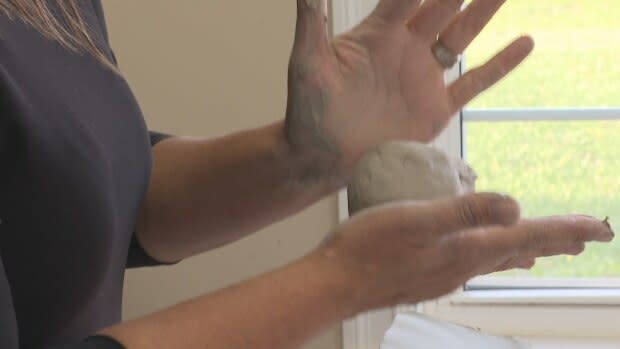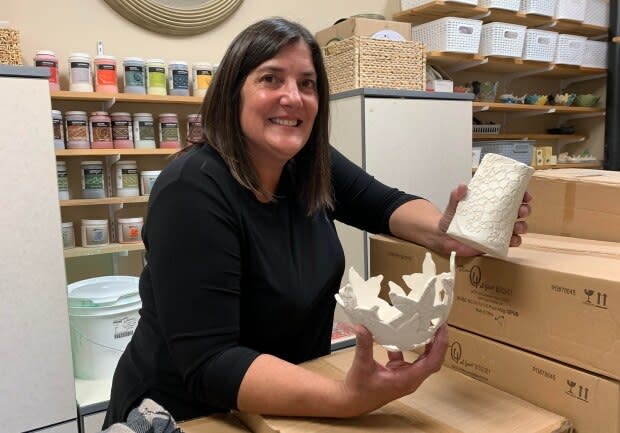How this psychology centre is using pottery as mental health therapy

A mental health treatment centre in Prince Edward Island will soon be treating patients with post-traumatic stress disorder and other mental illnesses through creating pottery.
Donna MacLeod has been an occupational therapist for almost 30 years, the last two years at Serene View Ranch in Alexandra, P.E.I., which is known for treating patients using equine therapy. MacLeod has also enjoyed pottery as a leisure activity, sharing that passion at her Stratford business Happy Potter for the last few years.
"Everyone sort of says it's on their bucket list — they've seen Ghost, and now Brad Pitt is taking pottery, so it's a very fun, cool thing to do," MacLeod said with a laugh.
"But there's a lot, when you analyze the activity, of therapeutic benefits from a mental health perspective."

She said while the hands-on activity of pottery was on pause during the COVID-19 lockdown this spring, she took some time to evaluate her career and decided to combine occupational therapy and pottery.
'Too helpful not to offer clients'
"More and more, the Canadian Association of Occupational Therapists have been putting out webinars and courses on the value of arts and art therapy in mental health, and I have the studio, I have the skills, why aren't I sharing that? It just felt like the right thing to do," she said in a physically-distanced interview in her studio, which has partnered with Serene View Ranch to form the SVR Creative Arts Centre.

"[I] decided that this was too helpful not to offer to clients." MacLeod said she checked with the P.E.I. College of Occupational Therapists and got the green light to incorporate pottery into her practice.
"The movement toward arts and crafts again for mental health is being proven — always has been — to be helpful," she said.
How is it helpful? First and foremost, MacLeod said, pottery is relaxing. In fact, she notes it's very difficult to do if one is tense.
She demonstrates — planting her feet firmly on either side of the pottery wheel, elbows on knees, bent over the wheel with soft, rounded hands shaping the moistened clay. When asked a question, she can't answer it — her mind is too engaged in what she is doing. That is big therapeutic benefit, she said: all other thoughts, such as trauma in someone who has PTSD, are blocked out for a time, and there's no room for ruminating or recurring negative thoughts.
Touching and smelling the clay and hearing the whir of the pottery wheel engages the senses and can lower cortisol, the stress hormone that can be physically and mentally harmful if at a high level too long, MacLeod said.
'We see healing happen'
Serene View Ranch's owner Caroline LeBlanc is a registered psychotherapist and has been working with trauma victims for the last several years — mostly first responders like veterans and police officers, who get priority for treatment at the ranch over the general public.

"What we see with clients that have experienced trauma is they have lost a sense of themselves and they've also lost a sense of their bodies. So they experience a lot of muscle tension, they experience a lot of difficulties regulating their emotions, and they have a very difficult time experiencing joy and fun," LeBlanc said.
"What pottery is going to do and hopefully help them with, is bringing them to the here and now in a mindful state. It will hopefully engage them with their five senses, get them more grounded, get them more present — it will also help them to develop a sense of their body, by using their hands and their legs and positioning themselves in a way that's more relaxed, versus how they typically are which is very rigid and stiff."
She says traditional talk psychotherapy — patient on couch, therapist with notepad in hand — is only partially useful in treating trauma patients. Most start with therapy that stabilizes them physically and emotionally.
"A lot of times, trauma victims, the front part of their brain which is called the prefrontal cortex — where they reason, think, plan — is less active. And their limbic system where their fight-flight is located is very activated. So it's easy to say to somebody 'relax' but that doesn't do anything for them," LeBlanc explains.
"With pottery, and horses, we take them back to their senses, back to their bodies, and learn how to be present, how to be grounded.... the front part of their brain will start to be more online, and we see healing happen."
'Hey, I made this!'
Successfully creating a piece of art has all kinds of benefits too.

"We see an increase in self-esteem, confidence and a sense of mastery to actually make something, whether it's a platter or a mug or a bowl — like, 'Hey I made this!'" MacLeod said.
MacLeod said she's excited for the first clients to try pottery at the studio.
"I've observed it with the general population and my own family for years and years, and I can't wait to see how it helps that person that's been too nervous to leave their home and come in the doors, to create a safe environment to let people try that and experience the benefits of pottery," she said, choking up.
Pottery may be helpful during various parts of a person's recovery, she said. And in some cases, the trip to the studio is itself the therapy.

"Some of the clients I have in my caseload have not left their house for maybe weeks, months or years, or may just go because of medical appointments," she explained. "So for me, I would be happy that I would be able to create a place that people feel is safe, that they can leave their home and be able to just relax in a different setting."
LeBlanc said she believes along with yoga and equine therapy, pottery will be an important tool in the centre's repertoire.
"That's what my hopes are for pottery — that it will also provide our clients with a way to find themselves and work towards the journey of healing," she said.
The centre has also recently added music therapy, which is also part of the Serene View Ranch Creative Arts Centre.
More from CBC P.E.I.


